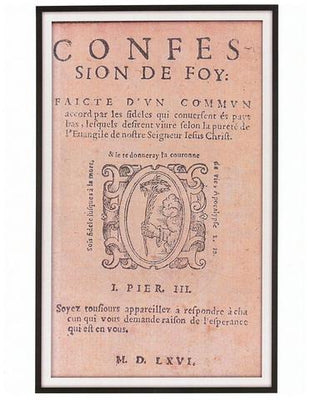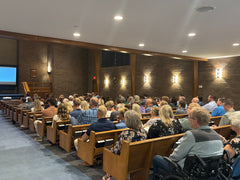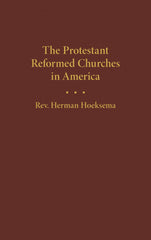Your cart is empty now.
As To Conditions (2)
According to the Heidelberg Catechism, as we have seen, faith is never presented as a condition unto salvation, or as a condition which we must fulfill in order to enter into or remain in the covenant of God. Always it is presented as a means or instrument which is wrought in us by God and given us of Him, by which we are ingrafted into Christ, become one body with Him, and thus receive all His benefits.
Instrument and condition certainly do not belong to the same category of conceptions.
If faith is a condition it certainly is something man must do in order to and before he can obtain salvation. Unless we attach that meaning to the word it has no sense at all. And as I wrote before, in the minds of the people the term condition undoubtedly stands for some notion that makes salvation dependent on something man must do.
If, however, faith is a God-given instrument it is completely outside of the category of condition, for the simple reason that, in that case, it belongs to salvation itself. It is part of the work of God whereby He brings sinners to Christ and makes them partakers of all His benefits of righteousness, life, and glory. And part of salvation cannot, at the same time, be a condition unto salvation.
RFPA Update - Summer 2019
IN THIS ISSUE: A new Bible story book: Jehovah's Mighty Acts Our first audio book A...
The Belgic: "A Confession of the Gospel in all its riches"
The Belgic Confession: A Commentary, Volumes I–II by David J. Engelsma. Jenison, MI: Reformed Free Publishing Association, 2018–19. 348 and 382 pages. Reviewed by Dr. H. David Schuringa, a reformed theologian living in West Michigan (as reviewed in the July 24, 2019 issue of Christian Renewal).
The publishing of Dr. David Engelsma’s two-volume commentary on the Belgic Confession is a welcome event due not only to its meaty content but also to meager current resources. The historic confession comprises a complete dogmatics in its own right as it follows the usual outline of the loci with the doctrines of the Word, God, Christ, the Holy Spirit, Ecclesiology and Eschatology.
Engelsma maintains, however, that though the confession is doctrinal and systematic, it is not a systematic theology as such but rather, “the confession of the gospel in all its riches as this gospel is known by every illumined mind and embraced by every regenerated heart” (II:366f.). That is certainly true in large measure, which in turn makes these two volumes Engelsma’s own dogmatics of sorts. What Berkhof did for Bavinck, he does for Hoeksema.
Belgic Confession (volume 2) chapter preview: Article 25 on "The Abolishing of the Ceremonial Law"
IN ONE MONTH volume two of The Belgic Confession commentary will be printed, completing the two-volume set written by Professor David J. Engelsma.We give to you the full Chapter 19 on Article 25: "The Abolishing of the Ceremonial Law."
Coming in 1 month!
IN ONE MONTH volume two of The Belgic Confession commentary will be printed, completing the two-volume set written by Professor David J. Engelsma.
We provide you with an excerpt from Chapter 17: Justification as Experience.
Justification by faith alone, without works, not only excludes works from God’s justifying act, but also from the believer’s knowledge and certainty of righteousness with God. If this were not the case, “we should always be in doubt, tossed to and fro without any certainty, and our poor consciences would be continually vexed.”
Therefore, to teach that in the end the experience and assurance of righteousness with God are realized by the sinner’s good works, or are somehow dependent upon the good works of the sinner, is the denial of justification by faith alone. In that case, faith would need the help of the sinner’s works to give the blessing of justification. Union with Christ and his work would not be enough.















